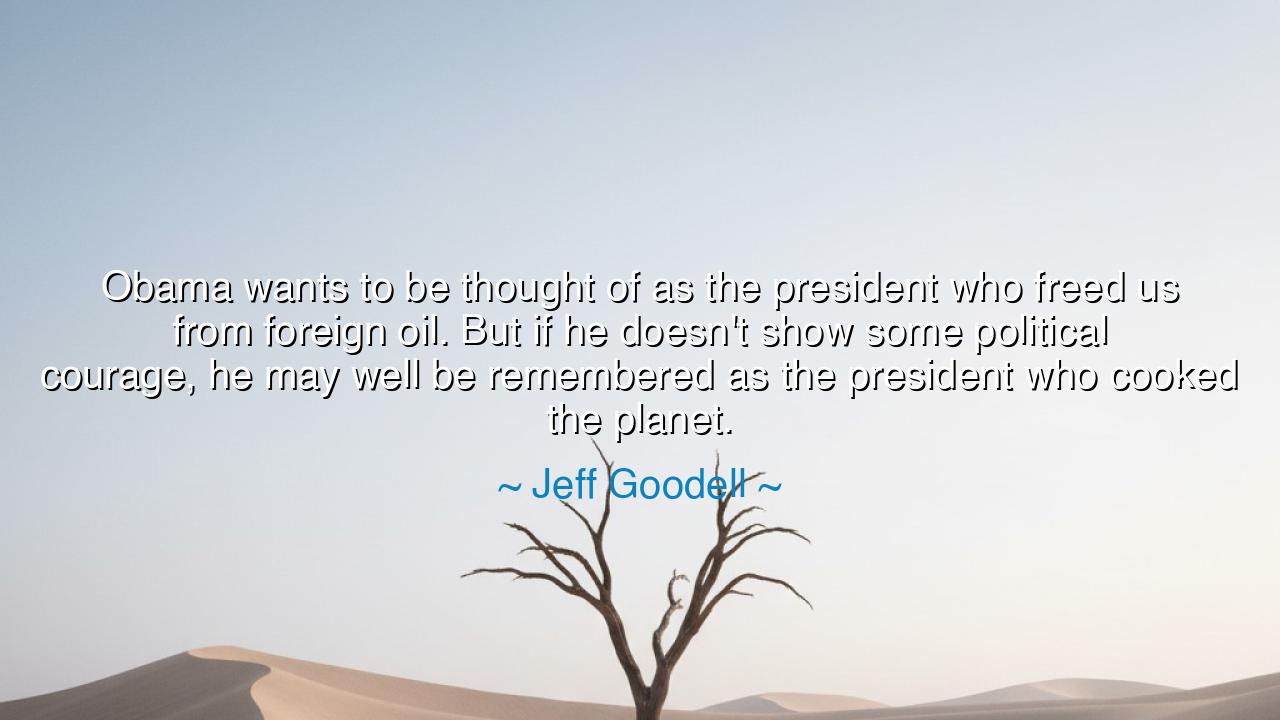
Obama wants to be thought of as the president who freed us from
Obama wants to be thought of as the president who freed us from foreign oil. But if he doesn't show some political courage, he may well be remembered as the president who cooked the planet.






“Obama wants to be thought of as the president who freed us from foreign oil. But if he doesn’t show some political courage, he may well be remembered as the president who cooked the planet.” Thus wrote Jeff Goodell, a journalist and seeker of environmental truth, whose words burn with both warning and wisdom. In this statement, he speaks not merely of one man, nor of one presidency, but of the eternal struggle between ambition and responsibility, between the desire for praise and the duty to protect the earth. His words, sharp as the edge of prophecy, remind us that courage — not comfort, not caution — is the measure by which history judges its leaders.
Goodell’s quote was born in the age of climate reckoning, when the world stood at the crossroads between progress and peril. President Barack Obama, like many leaders before him, aspired to greatness — to end the nation’s dependence on foreign oil, to strengthen energy independence, and to secure prosperity. Yet Goodell saw a deeper danger: that in seeking one form of liberation, humanity might bind itself in another, far more devastating chain — the destruction of the planet itself through inaction on climate change. His words are both a challenge and a lament, calling upon those in power to act not for glory, but for the survival of life itself.
At its heart, this quote is a meditation on political courage, the rarest virtue of governance. For it is easy for a ruler to seek popularity, to promise comfort, to avoid the wrath of the powerful. But true courage, as the ancients taught, is the will to act rightly even when the world resists. Goodell’s warning was clear: that to hesitate in the face of ecological crisis is not prudence — it is betrayal. The earth does not negotiate; it responds. And every delay, every compromise born of fear, brings the planet closer to the furnace of ruin.
This truth has echoed through the corridors of history. Consider the tale of Emperor Marcus Aurelius, who in ancient Rome faced plague, famine, and unrest. While lesser rulers sought to distract the people with spectacle or war, Aurelius chose virtue over vanity. He lived simply, listened to reason, and sought wisdom even in suffering. His courage lay not in conquest, but in restraint — the courage to do what was right, not what was easy. So too did Goodell call upon Obama, and by extension all leaders, to act with that same moral strength — to face the wrath of industry and politics for the sake of the generations yet unborn.
The origin of Goodell’s warning is deeply rooted in his lifelong work as an environmental writer, especially his fierce advocacy for action against global warming. He saw with clarity what many preferred not to see: that the age of oil and carbon had brought humanity to the brink of self-destruction. To him, climate change was not a political issue but a moral one — a test of whether human beings could govern themselves wisely. His words echo the wisdom of prophets and philosophers: that to command the earth is to care for it, and that courage is the bridge between knowledge and action.
In a way, his statement is a mirror for all who hold power, whether rulers or citizens. Each of us, in our own realm, must find the courage to confront truth rather than hide from it. The destruction of the environment is not the work of one leader alone, but of countless hands unwilling to sacrifice comfort for conscience. To “cook the planet,” as Goodell so vividly phrases it, is to betray the sacred trust between humanity and creation. But to act — to plant, to conserve, to innovate, to speak truth to power — is to rekindle hope. The call for courage is not distant; it is immediate and personal.
Let this be the lesson, then: courage is not the roar of ambition but the steady flame of duty. In the face of great challenges — whether political, environmental, or moral — the true leader is not the one who seeks applause, but the one who dares to do what is necessary. Each generation must choose whether to live as guardians or as destroyers, as stewards of life or architects of loss. The measure of our time will not be in our wealth or weapons, but in whether we left the world better than we found it.
So remember the wisdom of Jeff Goodell: that without political courage, progress becomes destruction in disguise. The earth is both our cradle and our covenant — it asks only that we care for it as it has cared for us. Let those who lead, and those who follow, rise with courage to protect it. For if we fail to act with bravery now, history will not remember our intentions — only our indifference. And then, as Goodell warned, we will not have freed ourselves at all — we will have cooked the planet.






AAdministratorAdministrator
Welcome, honored guests. Please leave a comment, we will respond soon